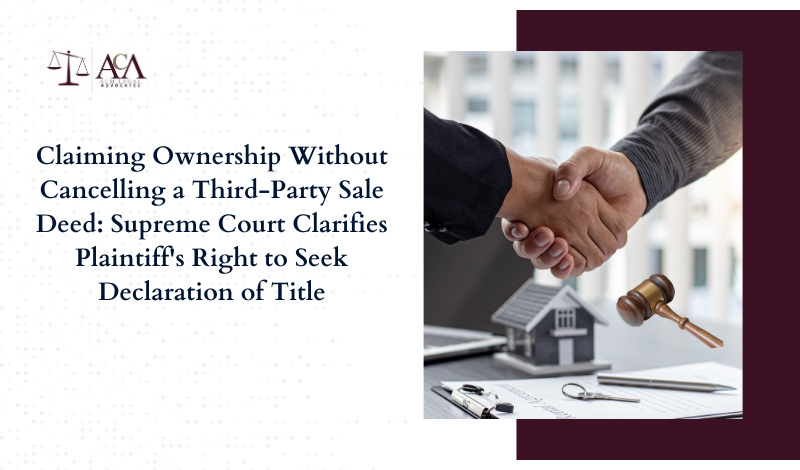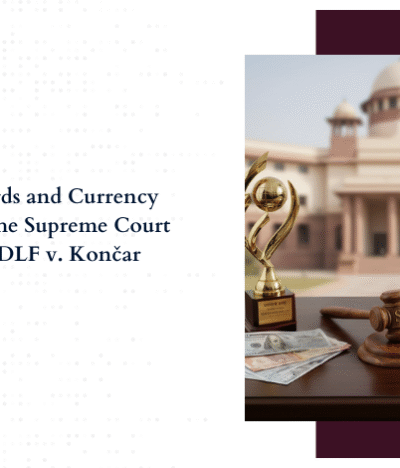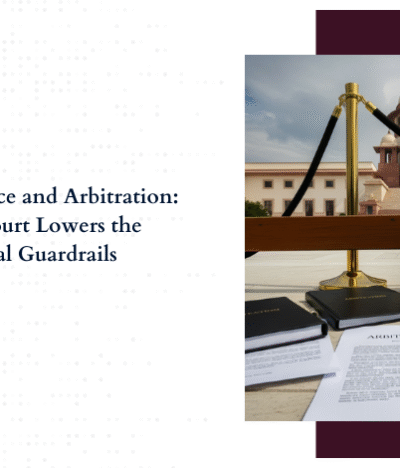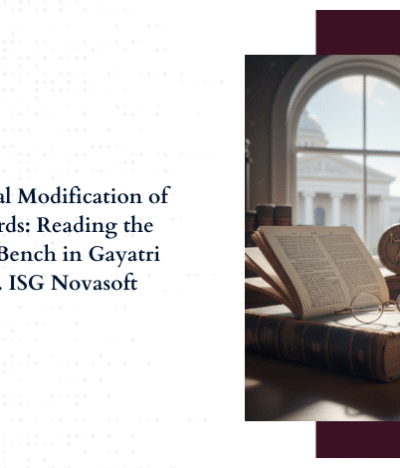In a significant ruling that addresses a recurring point of contention in civil litigation, the Supreme Court of India, in Appeal No. 8592 of 2016, has clarified that a plaintiff can seek a declaration of title to property without necessarily seeking the cancellation of a sale deed executed by another party. The decision was rendered by a two-judge bench comprising Hon’ble Mr. Justice B.R. Gavai and Hon’ble Mr. Justice Sandeep Mehta, who upheld the appellant’s right to establish title independent of a challenge to a subsequent sale deed executed by a third party.
The dispute stemmed from a series of land transactions involving agricultural land admeasuring 1.65 hectares bearing Gat No. 73 situated at Mauje Bhivpur, Taluka and District Parbhani. The property was initially purchased by the plaintiff-appellant for ₹8,000 via a registered sale deed dated 29.04.1980 from the original owner Mr. Bapurao Kachruji Rathod. The land was in possession of the plaintiff since the date of purchase.
The litigation began when defendant No. 1, Mr. Bapurao, subsequently executed a second sale deed dated 28.08.1991 in favour of defendants No. 2 and 3, who were his nephews, for the same parcel of land. This prompted the plaintiff to file Regular Civil Suit No. 267 of 1992 seeking a declaration of ownership and a permanent injunction restraining the subsequent purchasers from interfering with his possession.
Trial Court Findings and Appellate Journey
The Trial Court, after evaluating the documentary and oral evidence, decreed the suit in favour of the plaintiff on 30.12.2003, declaring him to be the owner of the suit property and in possession thereof. The Court issued a permanent injunction restraining the defendants No. 2 and 3 from disturbing the plaintiff’s possession.
The Trial Court was persuaded by the unambiguous evidence produced by the plaintiff, including:
- The registered sale deed dated 29.04.1980 executed by Bapurao in favour of the plaintiff;
- The continuous possession of the plaintiff since the date of the sale;
- The subsequent sale deed dated 28.08.1991 in favour of defendants No. 2 and 3 was treated as being non-binding on the plaintiff, since the vendor had already parted with the title.
Aggrieved, defendants No. 2 and 3 preferred an appeal bearing Regular Civil Appeal No. 48 of 2004, which was dismissed by the learned Principal District Judge, Parbhani on 30.06.2005. The appellate court affirmed the findings of the Trial Court, emphasizing that Bapurao had no title to transfer on 28.08.1991, having already sold the property to the plaintiff in 1980.
Subsequently, the defendants approached the High Court of Judicature at Bombay, Bench at Aurangabad, by way of Second Appeal No. 378 of 2005. The High Court reversed the concurrent findings of the courts below and dismissed the suit, holding that the plaintiff could not seek a declaration of title without praying for cancellation of the subsequent sale deed.
The High Court relied on Section 34 of the Specific Relief Act, 1963, and concluded that since the plaintiff did not seek to cancel the 1991 sale deed, the relief of declaration of ownership was not tenable. This decision prompted the present civil appeal before the Supreme Court of India.
Supreme Court’s Observations and Final Ruling
The Supreme Court, in its detailed judgment dated 23rd April 2024, allowed the appeal, setting aside the High Court’s decision and restoring the concurrent findings of the Trial Court and First Appellate Court. The Bench of Justice B.R. Gavai and Justice Sandeep Mehta held that the plaintiff, as the rightful owner in possession under a valid registered sale deed, was not required to seek cancellation of a subsequent sale deed executed by a vendor who had already divested himself of title.
The Court underscored the distinction between void and voidable documents, clarifying:
“A plaintiff who is not a party to a sale transaction but is adversely affected thereby is not required to seek the cancellation of the document in terms of Section 31 of the Specific Relief Act.”
The Bench referred to several precedents to reinforce its position, including:
- “Vidya Devi v. Prem Prakash” [(1995) 4 SCC 496], which held that a stranger to a document need not seek its cancellation.
- “Sneh Gupta v. Devi Sarup” [(2009) 6 SCC 194], affirming that if a document is non est in law, a plaintiff can ignore it and seek declaration of title.
The Supreme Court observed that Section 34 of the Specific Relief Act, 1963 does not mandate the plaintiff to seek cancellation of the subsequent document unless he is a party to it. Since the plaintiff was not a party to the 1991 sale deed, it was deemed a nullity in law as far as his rights were concerned.
The Court concluded:
“In the present case, Bapurao had already transferred the property to the appellant-plaintiff vide a registered sale deed in the year 1980. He did not have any subsisting title or interest in the suit property when he purportedly executed the subsequent sale deed in favour of respondents No. 1 and 2 on 28.08.1991.”
Therefore, it held that the plaintiff was rightly entitled to a declaration of ownership and a permanent injunction, and there was no requirement in law for him to seek cancellation of the subsequent sale deed.
The appeal was allowed, the High Court’s judgment was set aside, and the decrees passed by the Trial Court and the First Appellate Court were restored.
Conclusion
This ruling has significantly fortified the legal position that a plaintiff asserting ownership and possession on the strength of a prior valid sale deed is not compelled to seek cancellation of a subsequent, unlawful conveyance to vindicate their title. By setting aside the High Court’s contrary view, the apex court has not only reinstated the plaintiff’s rights but also clarified an important aspect of civil procedural law.
By referring to binding precedents and dissecting the interplay of Sections 31 and 34 of the Specific Relief Act, 1963, the Supreme Court has offered a roadmap for lower courts on how to approach such disputes — a judicious blend of statutory interpretation and equity-based reasoning.






